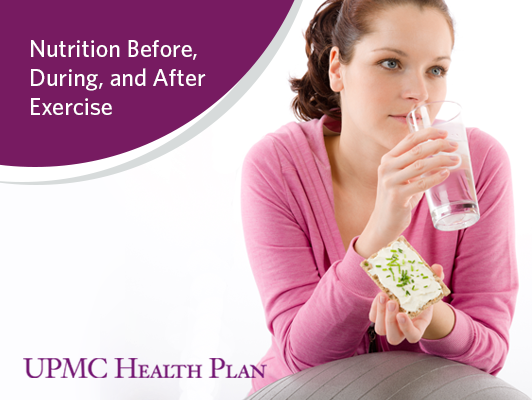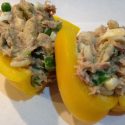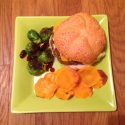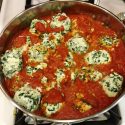What to eat before, during, and after exercise
While you are exercising, your body quickly demands nutrients and fluids. Those nutrients and fluids help fuel your muscles for sustained performance. Proper hydration and energy intake are essential for your body to function optimally. The tips below are general recommendations since the needs of individuals vary depending on their body composition and nutrient needs, the sport in which they participate, and their food preferences.
What to eat before exercise
- Consume a carbohydrate-rich snack or meal that includes small amounts of protein three to four hours before exercise.
- Avoid foods that are high in fat and fiber (such as beans, refined sugars, and fast food) as they are not easily digested.
- Stick with foods that you are familiar with right before a big competition. Try new foods during practice and in training to see how your body reacts.
- Pre-exercise food tips:
- Low-fat cottage cheese + apple butter + crackers + fresh grapes
- Oatmeal with brown sugar and almonds + skim milk + banana
- Lot-fat tuna melt sandwich + fruit cup + fat-free yogurt
- Consume 5 to 7 ml of water or sports drink per kg of body weight
What to eat during exercise
- The biggest need during exercise is to maintain the correct hydration level. Consume about 3 to 8 ounces of water every 15 minutes of your workout.
- Consume 30 to 60 grams of carbohydrates per hour of exercise when you are exercising for more than an hour. Space the carbohydrates out over that hour to avoid cramping.
- Choose carbs that are easily digested. Select a sports drink (3 to 8 ounces every 15 minutes), a sports bar (avoid high-fat bars for easy digestion), or a sports gel (consume one to two packs each additional hour).
- It is important to consume fluids early in your exercise routine as well as consistently throughout.
What to eat after exercise
- Recovery after exercise is essential to maintain proper growth and to avoid excessive soreness.
- Consume 20 ounces of fluid per pound of body weight lost during exercise to maintain hydration. You can do this by weighing yourself before and after your workout.
- Replace potassium, sodium, and carbohydrates that were lost during exercise and add protein to aid recovery.
- Protein is essential to help build and repair muscle damage that may have occurred during exercise. Endurance athletes should consume .8 to 1.0 g protein per kg of body weight while strength athletes should consume 1.2 g to 1.7 g of protein per kg of body weight.
- It is important to replace lost fluids and nutrients within one hour after exercise.
- Post-exercise food tips:
- Smoothies made with yogurt and frozen berries
- Whole wheat pita sandwich with turkey and veggies + pretzels + low-fat milk
- Rice bowl with beans, cheese, salsa, avocado + whole grain tortilla chips




